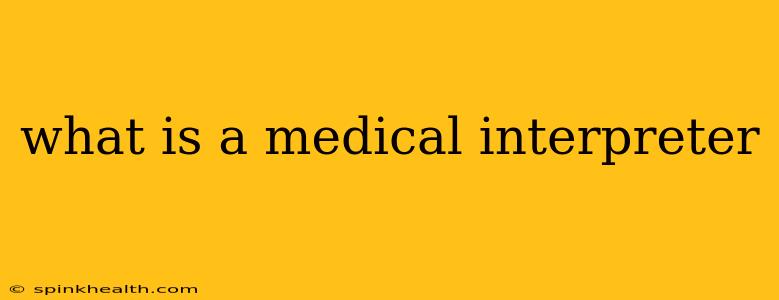What is a Medical Interpreter? Bridging the Gap Between Healthcare and Understanding
Imagine this: a doctor is explaining a serious diagnosis to a patient who doesn't speak English. The stakes are high, the information is complex, and a simple misunderstanding could have devastating consequences. This is where a medical interpreter steps in, acting as a crucial bridge between healthcare providers and patients with limited language proficiency. But their role is far more nuanced than simply translating words.
A medical interpreter is a highly skilled professional who facilitates clear and accurate communication between healthcare providers and patients who speak different languages. They go beyond literal translation, ensuring the meaning, nuance, and cultural context of medical information is conveyed accurately and completely. They are the vital link that ensures patients receive the care they need and deserve, regardless of language barriers.
What does a medical interpreter actually do?
Their work isn't as simple as just translating words. It's about conveying complex medical concepts in a way that is easily understood, regardless of the patient's level of health literacy. This involves:
- Accurate Interpretation: Conveying the meaning of medical terminology, diagnoses, treatments, and instructions accurately and completely, in both directions (patient to doctor and doctor to patient).
- Cultural Mediation: Navigating cultural differences that can impact communication and understanding, including nonverbal cues and differing perspectives on health and illness.
- Maintaining Confidentiality: Strictly adhering to ethical guidelines and maintaining patient confidentiality, ensuring sensitive information remains private.
- Advocacy: Acting as an advocate for the patient, ensuring their needs and concerns are heard and understood.
- Maintaining Neutrality: Remaining impartial and objective, avoiding personal opinions or biases.
What are the qualifications of a medical interpreter?
Becoming a medical interpreter requires more than just bilingualism. It demands specialized skills and training, including:
- Language Proficiency: Fluency in both the source and target languages, including medical terminology.
- Medical Terminology Knowledge: A deep understanding of medical terminology, procedures, and concepts.
- Interpretation Skills: Proficiency in sight translation (interpreting written materials), consecutive interpretation (interpreting after the speaker has finished), and simultaneous interpretation (interpreting at the same time as the speaker).
- Cultural Competency: Understanding the cultural nuances that can affect communication in the healthcare setting.
- Ethical Conduct: Adherence to strict ethical codes, ensuring confidentiality and impartiality.
Many medical interpreters pursue certifications and professional development opportunities to stay up-to-date on the latest medical terminology and best practices.
How do I find a qualified medical interpreter?
Hospitals and clinics often have their own interpreter services. If not, you can search online for certified medical interpreters in your area, or contact professional interpreter organizations. It's crucial to find an interpreter with relevant credentials and experience to ensure accurate and effective communication.
What types of settings do medical interpreters work in?
Medical interpreters work in a variety of settings, including:
- Hospitals: Working with patients in emergency rooms, inpatient units, and outpatient clinics.
- Clinics: Providing interpretation services in doctor's offices, dental offices, and other healthcare settings.
- Mental Health Facilities: Supporting communication between mental health professionals and patients.
- Community Health Centers: Serving underserved populations with limited access to healthcare.
- Legal Settings: Providing interpretation services during medical-legal proceedings.
What is the difference between a translator and an interpreter?
While both translators and interpreters work with languages, their tasks differ. Translators work with written text, converting documents from one language to another. Interpreters work with spoken language, conveying meaning between individuals speaking different languages in real time.
In conclusion, a medical interpreter is far more than just a bilingual person; they are a vital member of the healthcare team, ensuring effective communication, accurate information exchange, and equitable access to healthcare for all patients, regardless of language. Their skills and expertise are indispensable in providing quality and culturally sensitive care.

